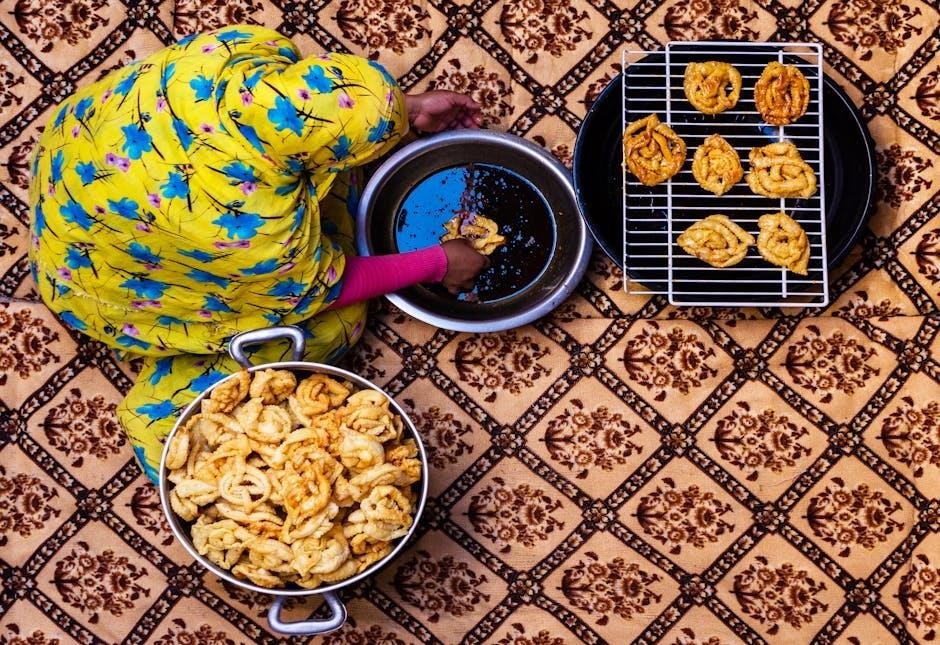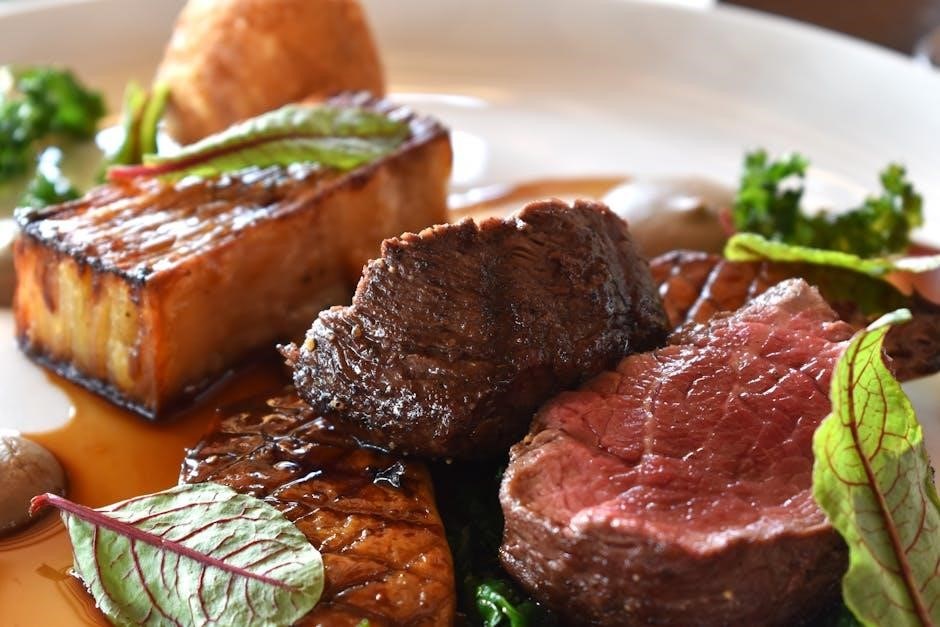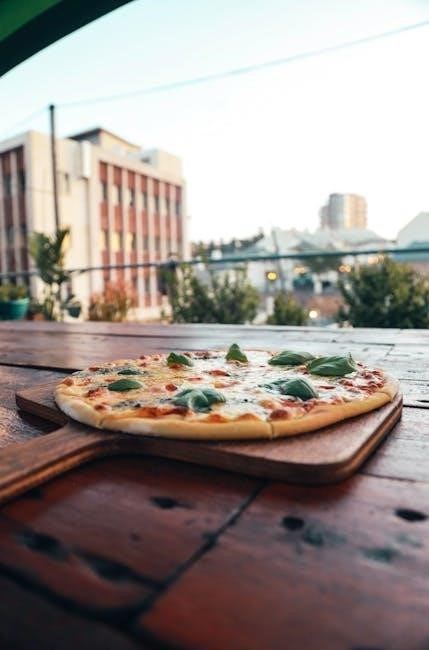food trail south africa recipes pdf

Embark on a vibrant culinary journey through South Africa, exploring its diverse regions and rich flavors. From Cape Malay spices to hearty braai traditions, discover authentic recipes and modern twists in Warren Mendes’ Food Trail South Africa cookbook, showcasing the country’s eclectic food culture and heritage.
What is a Food Trail?

A food trail is a culinary journey that explores the diverse flavors and ingredients of a specific region. It often highlights local produce, traditional dishes, and cultural influences, offering a gastronomic adventure. In the context of South Africa, a food trail showcases the country’s vibrant cuisine, blending indigenous, Dutch, Indian, and African flavors. Chef Warren Mendes’ Food Trail South Africa cookbook and TV series exemplify this concept, featuring over 100 recipes that celebrate the nation’s rich food culture. From bustling markets to hidden kitchens, a food trail reveals the stories behind each dish, connecting people to the land and its heritage. It’s a way to discover authentic flavors while exploring the country’s stunning landscapes and vibrant communities.
The Concept of Food Trail South Africa
Food Trail South Africa is a culinary initiative that celebrates the country’s diverse gastronomic heritage. Spearheaded by renowned chef Warren Mendes, it combines a TV series and a cookbook to showcase South Africa’s eclectic cuisine. The concept explores the nation’s vibrant food culture by visiting local markets, hidden kitchens, and scenic landscapes, uncovering authentic recipes and stories. It highlights the fusion of indigenous, Dutch, Indian, and African flavors, offering a unique perspective on traditional and contemporary dishes. The cookbook features over 100 recipes, from Cape Malay curries to braai favorites, while the TV series provides a visual journey through South Africa’s culinary diversity. This initiative not only preserves traditional cooking methods but also introduces modern twists, making it a must-explore for food enthusiasts and travelers alike.
Key Ingredients in South African Cuisine
South African cuisine relies on diverse key ingredients like spices, herbs, and indigenous plants, which reflect its rich cultural and geographical influences.
Staple Ingredients and Local Produce
South African cuisine is deeply rooted in its indigenous ingredients and local produce. Staple items include maize, beans, and legumes, while fresh fruits, vegetables, and grains are abundant. The country’s diverse climate supports a wide variety of crops, from mielies (corn) to sorghum and sunflower seeds. Local produce like gem squash, butternut, and leafy greens such as spinach and kale are integral to traditional dishes. Proteins often feature free-range chicken, beef, and game meats like kudu and springbok. Herbs and spices, including wild rosemary and buchu, add distinct flavors. These ingredients form the backbone of South African cooking, reflecting the nation’s rich agricultural heritage and cultural diversity.
The Role of Spices and Herbs
Spices and herbs play a pivotal role in shaping South Africa’s culinary identity, adding depth and complexity to its dishes. Cumin, coriander, and turmeric are staples in Cape Malay cuisine, infusing dishes like bobotie and curry with aromatic flavors. Chili peppers and peri-peri, derived from African bird’s eye chili, bring heat to many recipes. Fresh herbs such as parsley, cilantro, and wild rosemary are commonly used to enhance flavors in braai (barbecue) traditions and modern fusion dishes. The blend of these spices and herbs reflects the country’s cultural diversity, with influences from Dutch, Indian, and indigenous cuisines. They not only season food but also tell the story of South Africa’s rich history and its people, creating a unique and vibrant flavor profile that defines its culinary landscape.


Popular South African Dishes
South Africa’s diverse cuisine features iconic dishes like bobotie, a savory meat pie, and braai, a traditional barbecue. These dishes reflect the country’s rich cultural tapestry and flavorful heritage.

Bobotie: A National Dish
Bobotie, a quintessential South African dish, is a flavorful savory pie that blends rich cultural influences. Made with spiced ground meat (often beef or lamb), dried fruit, and a custard-like egg topping, it is both aromatic and satisfying. Originating from Cape Malay cuisine, bobotie reflects the country’s diverse heritage. The dish is typically baked and served with yellow rice, sambals, and chutneys, enhancing its vibrant flavors. Its unique blend of spices, including cumin, coriander, and turmeric, creates a distinctive taste. Bobotie is a staple at family gatherings and celebrations, symbolizing comfort and tradition. Recipes for bobotie can be found in cookbooks like Food Trail South Africa, offering modern twists while preserving its authentic charm. This dish truly embodies South Africa’s culinary identity and its people’s love for hearty, flavorful meals.
Braai: The South African Barbecue Tradition
Braai, South Africa’s beloved barbecue tradition, is more than just a cooking method—it’s a cultural and social event. Rooted in community bonding, braai brings people together to savor grilled meats over an open flame. Typically featuring boerewors (a spicy sausage), steak, and chicken, braai is served with sides like pap en vleis (maize porridge with stew) and chakalaka (a spicy tomato relish). The setup often includes a grid over an open fire, with the aroma of smoky charcoal enhancing the flavors. Recipes for authentic braai dishes can be found in resources like Warren Mendes’ Food Trail South Africa cookbook, which captures the essence of this tradition. Braai is not just about food; it’s a celebration of togetherness, storytelling, and the vibrant South African spirit, making it a cornerstone of the country’s culinary identity and social fabric;

Modern Twists on Traditional Recipes

South African chefs are reimagining classic dishes with contemporary flair, blending traditional flavors with global techniques. Warren Mendes’ cookbook highlights innovative recipes like Rooibos Crème Brûlée and Spiced Tempura.
Contemporary Interpretations of Classic Dishes
South African cuisine is evolving with fresh, modern interpretations of beloved classics. Chef Warren Mendes’ Food Trail South Africa cookbook showcases dishes like Rooibos Crème Brûlée and Spiced Tempura, blending traditional flavors with global techniques. These recipes highlight how local ingredients and cultural influences are being reimagined for today’s palate. From Cape Malay Chicken Curry to innovative desserts, the cookbook offers a seamless fusion of heritage and innovation, inspiring home cooks to explore new culinary possibilities while staying rooted in South Africa’s rich gastronomic traditions.
Fusion Cuisine in South Africa
South Africa’s culinary scene thrives on fusion, blending indigenous, African, European, and Asian flavors into a vibrant melting pot. Chef Warren Mendes’ Food Trail South Africa cookbook exemplifies this trend, offering dishes like Rooibos Crème Brûlée and Beer & Boerewors Risotto, which merge local ingredients with global techniques. Fusion cuisine here reflects the country’s diverse heritage, creating bold, innovative flavors that appeal to modern palates. From Cape Malay spices infused into contemporary desserts to traditional braai meats paired with international marinades, South African fusion cuisine celebrates its multicultural roots while pushing culinary boundaries. This dynamic approach ensures that the country’s gastronomic identity remains fresh and exciting, attracting food enthusiasts worldwide.
Cultural Influences on South African Food
South African cuisine is shaped by indigenous, Dutch, Indian, and European traditions, blending flavors and techniques into a unique culinary identity that reflects its diverse heritage.

The Impact of Indigenous, Dutch, and Indian Cultures
South African cuisine is a vibrant blend of indigenous, Dutch, and Indian influences, creating a unique flavor profile. Indigenous communities introduced staple ingredients like sorghum, mielies, and wild herbs, forming the backbone of traditional dishes. Dutch settlers brought their love for hearty stews, baked goods, and preserved meats, such as boerewors, which became a national favorite. Indian indentured servants, arriving in the 19th century, infused the cuisine with aromatic spices and curry-based dishes, like bobotie and samosas. These diverse culinary traditions have harmonized over time, giving birth to iconic dishes that reflect the country’s multicultural identity. Today, chefs like Warren Mendes celebrate this fusion in their recipes, offering a modern take on these timeless flavors through initiatives like the Food Trail South Africa cookbook.

The Role of African, European, and Asian Fusion
South Africa’s culinary identity is deeply rooted in the fusion of African, European, and Asian cuisines. African traditions contribute earthy flavors like mieliepap and wild herbs, while European influences, particularly Dutch, are evident in dishes such as boerewors and stews; Asian spices, introduced by Indian and Cape Malay communities, add bold aromas to dishes like bobotie and curry. This cultural blending is celebrated in modern recipes, where chefs like Warren Mendes merge these flavors to create innovative yet authentic dishes. From the hearty boerewors roll to the fragrant Cape Malay chicken curry, South Africa’s cuisine reflects its rich history of cultural exchange. The Food Trail South Africa cookbook highlights these fusion recipes, offering a taste of the nation’s diverse heritage and its ongoing culinary evolution.
Regional Culinary Diversity
South Africa’s culinary landscape varies widely by region, with Cape Malay flavors in the Western Cape, hearty dishes in the Eastern Cape, and vibrant street food in Johannesburg.
Cape Malay Cuisine of the Western Cape
Cape Malay cuisine, a cornerstone of South Africa’s culinary diversity, is deeply rooted in the Western Cape. This unique fusion of African, Asian, and European flavors is characterized by aromatic spices like cumin, coriander, and turmeric, which are central to its distinct taste. Dishes such as Cape Malay Chicken Curry and Biltong Quiche highlight the blend of traditional methods with contemporary twists. Recipes from the Food Trail South Africa cookbook, inspired by Warren Mendes’ gastronomic journey, feature these iconic dishes, offering a gateway to the rich cultural heritage of the region. The use of local ingredients and centuries-old cooking techniques ensures that Cape Malay cuisine remains a vibrant and essential part of South Africa’s food identity.
Traditional Dishes from the Eastern Cape
The Eastern Cape boasts a rich culinary heritage, with traditional dishes reflecting the region’s cultural diversity. Umngqusho, a hearty samp and bean dish, is a staple, often served with meat or vegetables. Inkosinko, a thick cornmeal porridge, is another local favorite, frequently accompanied by stews or relishes. The area is also known for its fresh seafood, particularly along the coastline, where dishes like Crayfish Pasta and Peri-Peri Seafood are celebrated. These recipes, featured in the Food Trail South Africa cookbook, highlight the use of local ingredients and traditional cooking methods. The Eastern Cape’s cuisine is a testament to its vibrant cultural identity, blending indigenous flavors with external influences to create unique and flavorful dishes that captivate food enthusiasts.
Gastronomic Highlights from Johannesburg
Johannesburg, the vibrant heart of South Africa, offers a diverse culinary scene that reflects the country’s cultural melting pot. The city is renowned for its eclectic mix of traditional and modern dishes, showcasing the rich flavors of the region. Sosaties (meat skewers) and Bobotie are among the city’s favorite dishes, often featured in local restaurants and markets. Johannesburg also boasts a thriving foodie culture, with a focus on artisanal products and craft beverages. The Food Trail South Africa cookbook highlights these gastronomic delights, offering recipes like Beer and Boerewors Risotto and Peri-Peri Seafood, which blend traditional ingredients with contemporary twists. The city’s culinary landscape is further enriched by its diverse population, creating a vibrant and dynamic food scene that continues to evolve and inspire. Johannesburg’s cuisine is a true reflection of South Africa’s cultural diversity and culinary innovation.

Resources for South African Recipes
Discover authentic South African recipes through Food Trail South Africa by Warren Mendes, offering over 100 dishes. Find recipe PDFs online, featuring Rooibos Crème Brûlée and Cape Malay Chicken Curry.
The “Food Trail South Africa” Cookbook by Warren Mendes
Chef Warren Mendes’ debut cookbook, Food Trail South Africa, is a culinary masterpiece inspired by the hit TV series. This book takes readers on a gastronomic journey across South Africa, showcasing over 100 authentic recipes that highlight the country’s diverse food culture. From Cape Malay curries to hearty braai favorites, Mendes brings together traditional and contemporary dishes. Each recipe is crafted to reflect the rich cultural heritage and vibrant flavors of South Africa. The cookbook also includes stunning visuals and stories behind the dishes, making it a must-have for food enthusiasts. Available in both physical and digital formats, it’s a perfect resource for home cooks and professional chefs alike. Additionally, recipe PDFs from the cookbook can be found online, offering easy access to Mendes’ creations.
Finding South African Recipe PDFs Online
Discovering authentic South African recipes is now easier than ever, with numerous resources available online. The Food Trail South Africa cookbook by Warren Mendes is a primary source, offering over 100 recipes in both physical and digital formats. Additionally, many websites provide free South African recipe PDFs, featuring dishes like bobotie, braai favorites, and Cape Malay curries. Platforms such as food blogs, e-commerce sites, and recipe-sharing forums often host these downloadable guides. Some popular options include online marketplaces and culinary websites specializing in African cuisine. Users can also find PDF versions of Mendes’ recipes from episodes of the Food Trail South Africa TV series. Whether you’re a novice or an experienced chef, these resources make exploring South Africa’s vibrant food culture accessible and convenient. Always ensure to verify the authenticity of the sources for the best culinary experience.
Leave a Reply
You must be logged in to post a comment.